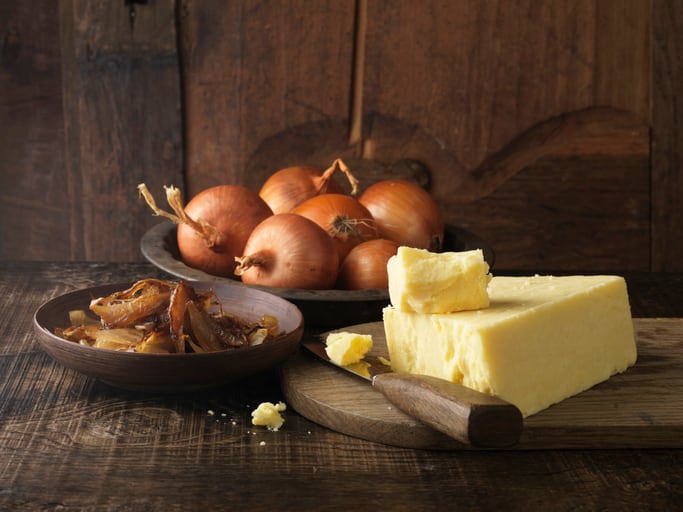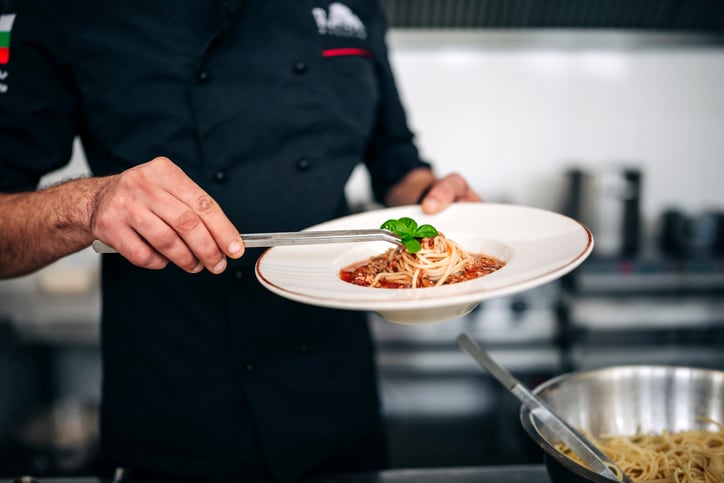Mounting political pressure to cut back on ultra-processed foods paired with the rise of weight-loss drugs is fueling demand for nutrient-dense, minimally processed food that does not sacrifice on taste or convenience.
At the same time, US shoppers feeling pinched by inflation want food that is affordable, but which also helps them recreate at home the joy of eating at restaurants or which offers a sense of celebration or adventure, such as through unexpected flavor combinations or cultural connections to global communities.
Cheese checks all these boxes, and more – helping to drive up sales of specialty varietals in the US to a projected $9.2 billion by 2030 from an estimated $6.6 billion in 2024, according to Grand View Research.
At the Summer Fancy Food Show in New York City, cheesemakers with Friesland Campina and Cypress Grove revealed to FoodNavigator-USA’s Soup-To-Nuts Podcast how they are balancing consumer demand for nutrition, indulgence and value. The iconic fondue restaurant Melting Pot also unveiled a new line of artisanal cheese spreads, sauces and kits that reimagine its signature experience for consumers dining at home.
Explore past episodes of Soup-To-Nuts podcast
Never miss an episode of FoodNavigator-USA’s Soup-To-Nuts podcast - subscribe today.
Investors return to CPG, but with caution and only for the right kind of growth – Pitchbook reports a modest rebound in private equity deals in Q1 of 2025, and JPalmer Collective’s Jennifer Palmer sees reasons for optimism for mission-driven brands and women-owned and -led brands. But both warn the current uncertainty is the new norm
4 trends at IFT FIRST sending food formulators back to the drawing board - Consumers want it all - nutrient-density, satiety, clean-label and fun - and ingredient innovators at IFT FIRST are helping brands meet their myriad demands with new options and boosted production
Catch up on past episodes of Soup-To-Nuts: What is driving pasta’s resurgence in the US? – Despite more than a decade of demonization of carbs and grains, pasta sales in the US continue to climb as brands break free of commodity constraints and offer more nutrient-dense and premium products that deliver an elevated experience that still is affordable and fun
Beyond sober-curious: How long is the runway for non-alcoholic beverages? – While sales of non-alcoholic beverages are growing double-digits year- over-year, new research from NielsenIQ shows most NA consumers still buy alcohol – upending assumptions and forcing brands to rethink their outreach strategy
Conscientious chocolatier Alter Eco’s secret to sustainability success: ‘Show your receipts’ – At a time when many CPG companies are pulling back on sustainability initiatives – or at least not talking about them as vociferously as they were five years ago – premium chocolate maker Alter Eco Foods is proudly pushing forward and placing its environmental efforts center stage in consumer communications
Cheese checks clean-label, nutrient-dense demands
According to Innova Market Insights, one of the main drivers of specialty cheese is a demand for affordable nutrition, which may sound counterintuitive given the category’s premium pricing compared to commodities.
The market research firm breaks this down by noting that specialty cheese is packed with protein, low-carb and free from gluten and added sugar, which means it fits nicely into on-trend diets, like keto. Its high protein content also appeals to consumers taking weight-loss drugs who want to maintain muscle mass.
Still, specialty cheese can be expensive compared to many other products across categories that check those same boxes. However, unlike many protein bars and shakes, specialty cheese is perceived as simple, minimally processed and clean label – another growing attribute for which Innova says nearly 40% of US consumers are willing to pay more, despite ongoing inflation.
Bold flavors drive sales: ‘There is enough mediocrity in the world’
When it comes to specialty cheese, clean label or simple does not have to mean boring.
Rather, one of specialty cheese’s draws versus commodity staples is the elevated flavors, textures and deep cultural connections it offers, and its ability to make an otherwise routine snack or meal feel special.
This is the basis on which Humboldt County, California-based goat cheese producer Cypress Grove was founded in 1983, according to sales and marketing director Christy Khattab.
Cypress Grove Sales and Marketing Director Christy Khattab explained the company’s founder believed that Americans did not need to settle for the orange “rubbery” squares that passed for cheese in the 1970s. Rather, she promoted cheese could be “fresh and tangy” or “buttery” and “delicate” – a core value that has allowed the company to tap into one of the biggest emerging trends in specialty cheese, which is bold, global and fancy flavors.
“Fifty percent of the goat cheese that is sold is flavored,” in part because goat cheese can be off-putting for people who perceive it as ‘goaty’ or ‘gamey,’ she said, adding that using herbs, fruits, vegetables and other ingredients as flavors offers Americans an “on ramp” for goat cheese.
“One thing that is very differentiated about our brand is the flavor profiles that we’ve come up with. Our founder was very much under the assumption there’s enough mediocrity in the world, right? So if you’re going to do something, you really want to do it well. And she was really somebody that would like to take her cheese and fun seriously,” Khattab said.
Examples of the company’s distinctive approach to flavor include Meyer Lemon and Honey, Hatch Chile, PsycheDillic and Purple Haze with lavender and fennel pollen, Khattab said.
Specialty cheese helps consumers experience the world from their kitchens
Many US consumers also are embracing specialty cheese because it allows them to experience global flavors and cultural dishes at a time when many cannot afford to travel due to inflation, rising unemployment and uncertainty about the current geo-political climate.
For these consumers, cheese with a Protected Designation of Origin seal may have added appeal, explained Josh Rosen, brand manager of Friesland Campina consumer dairy.
At the Summer Fancy Food Show, Friesland Campina debuted a 12-month aged gouda with a Protected Designation of Origin seal under its award-winning A Dutch Masterpiece brand, which reassures consumers about the authenticity of the product and the caliber of flavor it will deliver.
Clear descriptions on pack help drive specialty cheese trial
Friesland Campina also recently revamped how its packaging describes the flavor profile of its products to help consumers better understand the added-value and higher price point of specialty cheese.
Rosen explained that this lowers the barrier for trial for consumers who may be intimidated by the specialty cheese case or unfamiliar with how different attributes, such as aging, impact the robustness or complexity of specialty cheese.
“We write on the label how old the cheese is – whether it is six months or 12 months – and then we also give a little description,” such as “firm and smooth with rich flavor and some crystallization,” he said.
Some of the company’s more approachable and everyday cheeses have an indicator scale ranging from mild to strong, which helps consumers quickly understand potential uses and what to expect, he added.
Specialty cheese elevates at-home entertaining as shoppers retreat from restaurants
As tariffs kick in and prices rise alongside jobless claims in the US, more consumers likely will pull back from eating out and instead look for ways to elevate entertaining at home or recreate restaurant experiences in their dining rooms.
Several restaurants are responding by bringing their brand to retails – including the iconic fondue chain The Melting Pot, which debuted at the Summer Fancy Food Show a line of fondues, artisanal cheeses and gourmet spreads.
The Melting Pot’s Director of Retail Jennifer Lukas-Bourgeois explains what sets the 50-year-old restaurant chain’s retail product apart is both its association with the restaurant, at which guests often celebrate milestones, and the clean-label, high quality ingredients it uses.
“We are just really excited to now have a different outlet to really get our product in people’s hands through grocery and e-comm, and then introduce people to the brand who maybe have heard of The Melting Pot but haven’t been to the restaurant” but will visit after trying the product at home, she said.
The company’s cheese-focused retail line up includes ready-to-heat cheese fondue in pouches made from aged cheddar and gouda made in Switzerland that is flash frozen for freshness and then combined with water, wine and potato starch, for a product that “is as clean as it can get,” Lukas-Bourgeois said.
The company also is launching six cheese spreads this fall, which Lukas-Bourgeois said pair with different occasions and cuisines.
Given The Melting Pot’s association with celebrations, Lukas-Bourgeois said the company is proactively positioning its products as everyday solutions – such as a burger topper or sauce to serve with vegetables – and encouraging retailers to stock it beyond the holidays or winter months.
Given the indulgent nature of fondu and specialty cheese more broadly, the category also is well positioned to tap into the emerging trend of ‘revenge spending,’ which Innova Market Insights defines as indulging in small treats as luxury spending comes under pressure or consumers look for affordable relief from mounting daily pressures and geopolitical tensions.
Innova Market Insights also suggests specialty cheese brands also could drive sales by expanding into ready meals, snacks and bakery categories, where cheese ingredients often are prominently featured. Currently, the most prominent cheese in US products are cheddar, parmesan and mozzarella, but the market research group sees significant potential for other varieties that, again, could elevate comforting or familiar foods.




